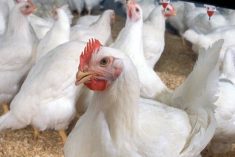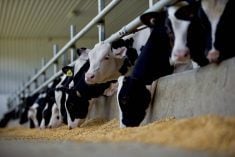(Reuters) — Dow Chemical Co. and DuPont are in talks to merge, creating a chemicals giant with a market value of more than $120 billion that could then break up into different businesses, people familiar with the matter said yesterday.
A deal, which would face regulatory approval in several countries, would allow the two U.S. companies to rejig their assets based on their diverging fortunes. Their plastics and specialty chemical businesses have benefited from lower energy costs, while their agrochemicals divisions have struggled to cope with weak demand for crop protection products.
Read Also

CBOT Weekly: China, shutdown guiding the market
The United States grain and oilseed markets are currently dominated by two factors, said Ryan Ettner, broker with Allendale Inc. in McHenry, Ill. Ettner said those are the absence of a trade deal with China and the ongoing United States government shutdown.
Following what would be structured as a merger of equals, the combined company could split into material sciences, specialty products and agrochemicals, the people said, cautioning that the plans have not been finalized.
Dow chief executive officer Andrew Liveris and DuPont CEO Edward Breen would have the two top jobs in the combined company, one of the people said. An agreement could be reached in the coming days, that person added.
Dow and DuPont declined to comment.
The Wall Street Journal first reported on the merger talks yesterday.
The possible merger may see cost synergies to the tune of $3 billion, CNBC reported ,citing people familiar with the matter.
As of yesterday’s trading close, Dow had a market valuation of $58.97 billion, while DuPont was valued at $58.37 billion.
DuPont, under Breen, who took over as CEO last month, had already been in talks with rivals, including Dow, about exploring options about its agriculture business.
Dow had also been reviewing all options for its farm chemicals and seeds unit, which has reported falling sales for nearly a year.
In August, the world’s largest seed company, Monsanto, abandoned a $45 billion bid for rival Syngenta as declining grain prices and farm income led to the major players in the farm chemicals and seeds business becoming the subject of consolidation talks.
However, even before the merger is announced, speculation is rife that the potential combination, which could overtake Germany’s BASF in revenue, may come under intense scrutiny by antitrust regulators.
“A deal like this will definitely be subject to close antitrust scrutiny by Chinese regulators, not just MOFCOM but many other government actors will be involved in the process. That doesn’t mean the deal will necessarily be prohibited,” said Angela Zhang, an antitrust expert at King’s College in London.
Zhang warns that the merger review process will be protracted. However, if the companies “can offer remedies that satisfy the Chinese regulators,” they could obtain clearance subject to conditions, Zhang said.
Breen took over after his predecessor and company veteran Ellen Kullman resigned abruptly in October. Best known as a turnaround expert, Breen was the CEO of Tyco between 2002 and 2012 and split Tyco into six companies, a sprawling conglomerate beset by scandal and strategic flip-flops.
DuPont, which gets about 60 percent of its sales from outside North America, has seen a strong dollar chip away 53 cents per share from its earnings this year. The company has been facing sliding sales for nearly two years.
Kullman had blamed much of the stock price drop on global markets, including a rising dollar, but some investors had already grown restless with her leadership, complaining that she was not fully executing on the changes she initiated.
In the intervening period in May, when Kullman was fending off a proxy battle from activist investor Nelson Peltz to get representation on the board, the company’s stock price fell over 25 percent, weakening her support among investors.
In analyst views, the appointment of Breen has been welcomed by Peltz, who has been pushing for DuPont to separate its volatile materials businesses from more stable businesses and save $2 to $4 billion in annual costs.
A 213-year-old company, DuPont makes products and chemicals that go into industries such as petrochemicals, pharmaceuticals, food and construction.
Dow-DuPont talks driven by investor pressure, weak farm demand
Dec 9 (Reuters) — Merger talks between Dow Chemical Co. and DuPont are likely to have been precipitated by shareholder pressure and weakening demand for crop protection chemicals, and such a deal would have been unlikely even a few months ago.
Stocks of both companies jumped 12 percent today, Dow’s to a record high of $56.80. DuPont hit a high of $74.62.
The Wall Street Journal first reported yesterday that the companies were in advanced talks to merge to become a $120 billion chemicals giant and then split into three companies focused on agriculture, specialty chemicals and materials.
“I think a deal like this couldn’t have happened three to six months ago,” said Sachin Shah, a merger arbitrage strategist at Albert Fried & Co., noting the companies’ sluggish stock performance had made a deal more doable.
Dow chief Executive officer Andrew Liveris said as recently as October that his company was not in the market for “big M&A.”
The deal, which Reuters sources and other media said would be presented as a “merger of equals,” would value DuPont’s stock at as much as $82 and Dow’s at as much as $68, trading firm Dragonfly Capital founder Greg Harmon said.
Dow and DuPont are struggling to cope with falling demand for farm chemicals, even as the companies’ plastics units have reported a rise in margins thanks to low natural gas prices.
Reports of the potential deal comes a week before the expiry of a standstill agreement between Dow and Daniel Loeb, under which the activist investor was to refrain from publicly criticizing the company for a year.
Dow added four independent directors to its board in November 2014, averting a proxy fight with Loeb, who had been calling for a split of the company’s petrochemical business from its specialty chemical units.
DuPont, similarly, faced pressure from Nelson Peltz to separate its agriculture, nutrition and biosciences units from its building and safety materials divisions.
Peltz lost a proxy battle for DuPont’s board seats in May, but chief Executive officer Ellen Kullman stepped down in October, having lost the confidence of the company’s shareholders.
Her successor, Ed Breen, who is known for overseeing the breakup of conglomerate Tyco International Plc, was key in getting talks going with Dow, analysts and investors said.














